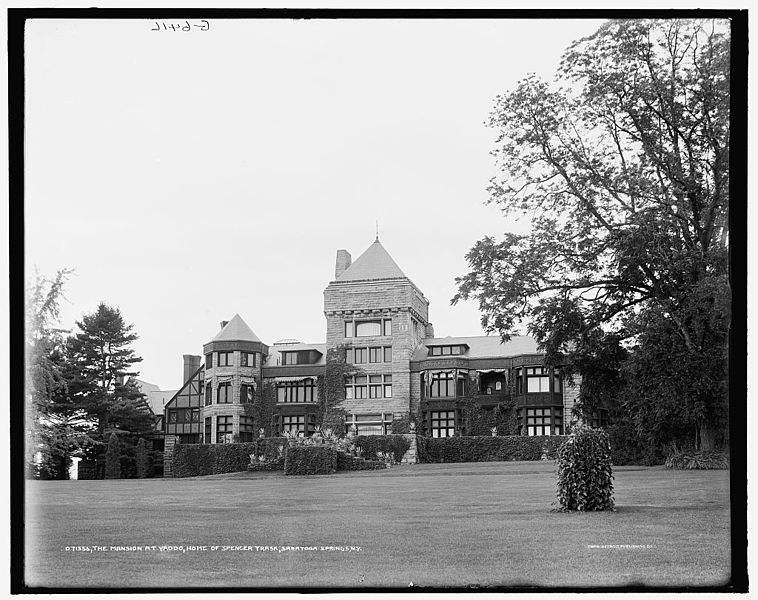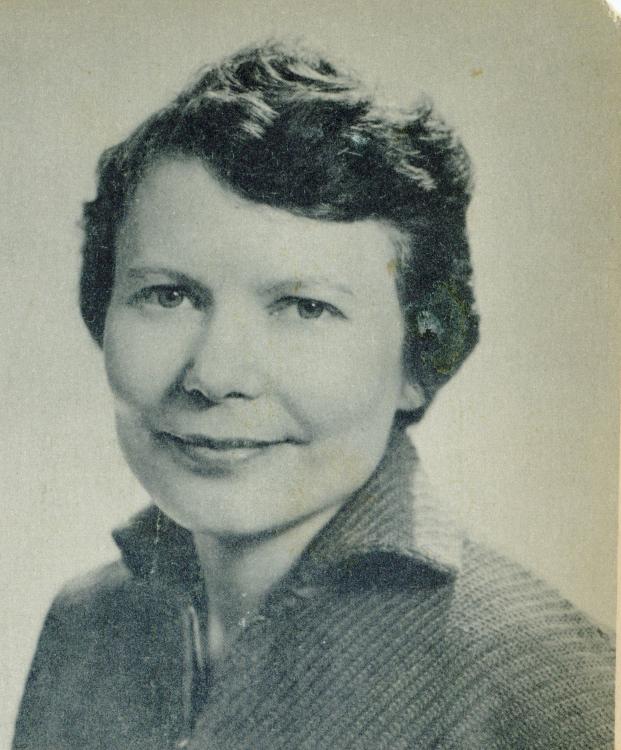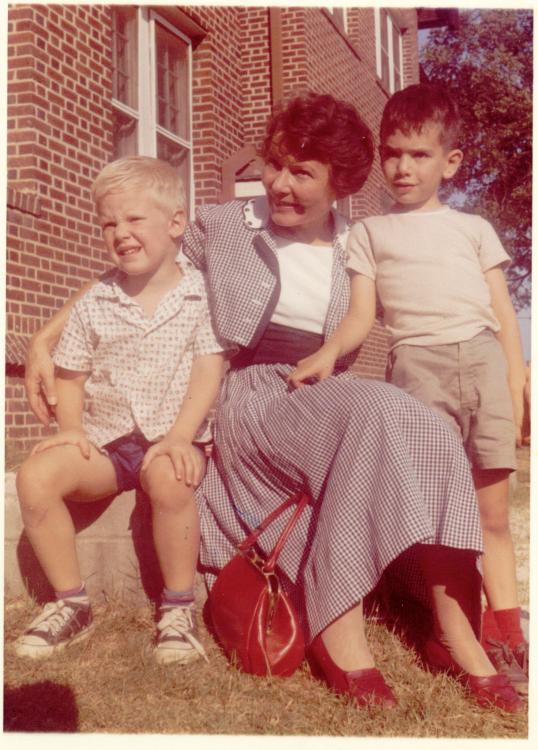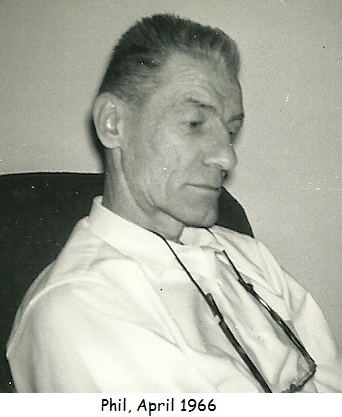Renate was born in Berlin in 1920, to Ida Wolff (nee Christiansen) and Georg Wolff. Ida and Georg had met on the battlefield during WWI, when she was an X-ray technician and he a physician at a field hospital. According to Renate, Georg had been destined by his family to marry a first cousin (then a not-unusual practice among European Jews), but he balked at such inbreeding. Going to the opposite extreme, he carefully selected Ida, with a last name that would remove all doubt about any genetic mixing: Christiansen.
Renate’s earliest years were, aside from a few health scares, idyllic, at least as she recalled them. The family had a maid (standard for middle-class families in those years) named Bertha (pronounced “Bear-ta”), whom Renate adored. There was a family dog, an Airedale, named Merri. Renate and her younger brother, Peter, did well in school, and the family took hikes in the forest and occasionally vacationed on the shores of the Baltic Sea.
Things changed abruptly, however, in 1933, when Adolf Hitler came to power and began the foundations of the Nazi state.
Life story
March 16, 1920
1933
In 1933, with Hitler’s ascent to power, life for Germany’s several million assimilated Jews became intolerable. Georg, Renate’s father , who had been on the faculty of medicine at the University in Berlin, lost his position, as did most professional Jews. Unlike many, and fortunately for all of us, he saw the future with sufficient clarity to take more or less immediate steps, and by about 1935, had secured a research fellowship for himself at the Johns Hopkins School of Medicine in Baltimore, MD, USA.
Georg Wolff worked alone in Baltimore, finding the hot mid-Atlantic climate abysmal, for three years, during which time he supported his family and worked towards their eventual emigration. In October of 1938, the family emigrated to the United States, sharing one final terrifying reminder of the long reach of Hitler’s shadow.
Georg Wolff worked alone in Baltimore, finding the hot mid-Atlantic climate abysmal, for three years, during which time he supported his family and worked towards their eventual emigration. In October of 1938, the family emigrated to the United States, sharing one final terrifying reminder of the long reach of Hitler’s shadow.
1938
Renate’s mother Ida Wolff boarded an ocean liner in the port of Bremerhaven in October 1938, with Renate, 18, and Peter, 15. Before being allowed to board, the family was submitted to final interrogation by German officers, who confiscated Ida’s savings account book (and its assets), and stamped “J” in the passports, marking the family as Jews. After departure, Renate and Peter learned to wake early in the morning and walk to the stern of the ship to watch the sun rise.
After several days at sea, the two teenagers went, as usual, to their post at the ship’s stern and awaited the gradual brightening that presaged the dawn. Nothing happened.
Renate described the surreal scene years later, as the two wondered if they had arisen too early, or if a storm were approaching. Finally, it occurred to them to turn around and look off the bow of the liner.
There, on schedule, rose the sun. During the night, the ship had turned around. It was now headed back to Bremerhaven, to the Nazi nightmare, and to an entirely uncertain and ominous future.
The crew remained silent on the matter, but eventually it was evident that Hitler had recalled all German shipping, anticipating the outbreak of war after his annexation of the Sudetenland, a disputed territory. Fortunately for the family, the Allies backed down, war did not erupt, and after a harrowing wait in the port city, holding their stigmatizing passports, the family, and the vessel, was allowed to depart.
After several days at sea, the two teenagers went, as usual, to their post at the ship’s stern and awaited the gradual brightening that presaged the dawn. Nothing happened.
Renate described the surreal scene years later, as the two wondered if they had arisen too early, or if a storm were approaching. Finally, it occurred to them to turn around and look off the bow of the liner.
There, on schedule, rose the sun. During the night, the ship had turned around. It was now headed back to Bremerhaven, to the Nazi nightmare, and to an entirely uncertain and ominous future.
The crew remained silent on the matter, but eventually it was evident that Hitler had recalled all German shipping, anticipating the outbreak of war after his annexation of the Sudetenland, a disputed territory. Fortunately for the family, the Allies backed down, war did not erupt, and after a harrowing wait in the port city, holding their stigmatizing passports, the family, and the vessel, was allowed to depart.
1939
 Upon arrival in the US, Renate, her brother, and their mother were reunited with Georg Wolff in Baltimore. Renate was granted a scholarship at Goucher College, where she began her lifelong study of the English Language and its literature, with a focus on American literature (to which she would later contribute herself).
Upon arrival in the US, Renate, her brother, and their mother were reunited with Georg Wolff in Baltimore. Renate was granted a scholarship at Goucher College, where she began her lifelong study of the English Language and its literature, with a focus on American literature (to which she would later contribute herself).Renate seems to have been a studious young woman, earnest in her work and relationships with others. She did, of course, participate in college activities to some extent. She related with relish the story of her “house-mother” in her dorm at Goucher, who, finding a rat in the pantry, proceeded to bludgeon it to death with the length of 2 x 4 that was used as a bolt on the door. To Renate, that was the prototype of the strongminded, independent, problem-solving woman.
After Goucher, Renate went on to obtain her Master’s Degree in Education at Smith College, and her Master’s of Arts and Ph.D at Bryn Mawr College. Subsequently, she taught at Wilkes College in Wilkes-Barre, PA and Wellesley College in Wellesly, MA, just west of Boston.
1952
By 1952, Renate had gained sufficient experience and academic credentials to join the stafff of the Merriam-Webster dictionary company as an Assistant Editor, in Springfield, MA, where she remained until 1956. There, she befriended Philip Goepp, II, who was an Associate Editor. Both contributed substantially to the company’s Third New International Dictionary.
In 1956, Renate moved again, this time to Spelman College in Atlanta.
In 1956, Renate moved again, this time to Spelman College in Atlanta.
1956
 Spelman College was, and remains, an acclaimed historically Black institution. Renate, drawn to the nascent Civil Rights movement, joined a small but determined and diverse group of faculty members devoted, first to the education of young Black women in the south, and second to the pressing issues of equality and the defeat of segregation, then still a fact of life in the deep south.
Spelman College was, and remains, an acclaimed historically Black institution. Renate, drawn to the nascent Civil Rights movement, joined a small but determined and diverse group of faculty members devoted, first to the education of young Black women in the south, and second to the pressing issues of equality and the defeat of segregation, then still a fact of life in the deep south.At Spelman, Renate met a number of people who were influential in the intellectual (and occasionally physical) struggle for civil rights. As a member of a persecuted minority herself, Renate may have felt a special sense of mission or commitment -- it’s also possible that she was simply following what was for her a lifelong vocation to do what she perceived as right regardless of public sentiment. Renate once described her vision of a saint as “A person who simply and unquestioningly takes literally what is written in the books of wisdom that we revere” (paraphrasing here). By that definition, Renate lived the life of a saint herself.
While at Spelman, Renate was able to spend part of the summer of 1957 at Yaddo, a retreat for promising artists in Saratoga Spring, NY. Yaddo’s mission is "to nurture the creative process by providing an opportunity for artists to work without interruption in a supportive environment.“
At least some interruption did occur at Yaddo, when Renate met Leonard Wolf (the names are a coincidence), himself a poet and writer. The two became close, and at some point that summer conceived a child together. Renate, true to her sense of fierce independence, returned to Spelman alone, with an amicable parting from Leonard that would last for more than 35 years.
1958
 Returning to Spelman, Renate resumed her teaching duties, pausing long enough to travel to New York to stay with a friend for the birth of her son, Julius, to whom she gave the middle names George (anglicized after her father), and Konrad, after an older man who was important in Renate’s life in those years. The boy was given the last name Wolf (single “f”), after his birth father, consistent with standard practice at the time.
Returning to Spelman, Renate resumed her teaching duties, pausing long enough to travel to New York to stay with a friend for the birth of her son, Julius, to whom she gave the middle names George (anglicized after her father), and Konrad, after an older man who was important in Renate’s life in those years. The boy was given the last name Wolf (single “f”), after his birth father, consistent with standard practice at the time.Renate’s other major accomplishment (as she put it herself) in those years was the publication by Simon and Schuster of her first novel, Johannes. Based on a tragic true story that Renate had read in a post-war German newspaper, the book is a fictionalized account of a young man in love with a cousin. While acheiving considerable critical acclaim, the book was not a strong seller. Renate carried her frustration and disappointment with the book’s poor reception for many years.
At Spelman, however, Renate remained a success, influencing the lives of many students who themselves went on to be influential. Renate counted among her former students at Spelman Alice Walker, Julian Bond (then a student at Morehouse College in Atlanta), and Marion Wright (later Wright-Edelman).
Also at Spelman, Renate became close friends with Alice and Staughton Lynd, and with Howard Zinn, all of whom were active in the Civil Rights movement. In 1963, Zinn was fired from the Spelman faculty as a result of some of his work in civil rights, including participating in sit-ins with Spelman students. Outraged, Renate promptly submitted her resignation, well before having secured a new position for herself anywhere else. This was an especially courageous act for an emigre woman and single mother still living in the deep South of the early 1960s.
1964
 In 1964, Renate left Spelman, having found and accepted a position as Assistant Professor of English at North Central College in Naperville, IL. As the movers packed up the small family’s belongings, Renate set out to drive from Atlanta to Naperville in her 1955 Dodge sedan, roomy enough to make a bed in the rear seat for Julius, then 6.
In 1964, Renate left Spelman, having found and accepted a position as Assistant Professor of English at North Central College in Naperville, IL. As the movers packed up the small family’s belongings, Renate set out to drive from Atlanta to Naperville in her 1955 Dodge sedan, roomy enough to make a bed in the rear seat for Julius, then 6. Renate was, by all accounts, a successful and beloved teacher at North Central, entering with ease and grace into the small-town, small-college atmosphere. Despite her duties as a full-time academic, she also devoted ample time to Julius, ensuring that he participated in summer camps and Cub Scouts; Renate became a Den Mother in the Scouts (not something she took to easily) in order to ensure that Julius had equal access to the activities typical for boys his age. On one occasion, unable to accompany him to a Father-Son breakfast, she negotiated with one of the fathers to bring her son along (the father was not terribly gracious about it, but did so). Renate also, during these years, made certain that her child and his playmates took advantage of the cultural activities available in nearby Chicago, hauling her pack of Cub Scouts to museums, plays, operas, and even a performance by the Vienna Boys’ Choir. On one occasion, one wayward Scout failed to board the “El” train in Chicago with the rest of the group; unfazed, Renate reboarded the train, pack in tow, and returned to the station, where she scooped up the tearful child and set out again on their journey - they had been on their way to meet Cassius Clay, the famous boxer, but some imposter named Mohammed Ali was in his place, to the dismay of the boys. It has never been clear how or why Renate knew anything at all about Ali, or why she thought it was important for her Scouts to meet him.
Sometime in 1967, Renate heard from Phil Goepp, her former colleague and friend from her days in Springfield at the dictionary.
1967
 After a brief courtship, Renate and Phil Goepp were married quietly in Springfield. It was a testimony to Phil’s love, patience, and character that he so readily adopted Renate’s son Julius, who was thereafter known as Julius Goepp.
After a brief courtship, Renate and Phil Goepp were married quietly in Springfield. It was a testimony to Phil’s love, patience, and character that he so readily adopted Renate’s son Julius, who was thereafter known as Julius Goepp. Phil found a position on the faculty of Frostburg State College (now university), in Western Maryland. The newly-united family moved to Frostburg in the summer of 1967, with copious help from Phil Goepp III and friends. As Phil (Dad) adjusted to his return to academics, Renate learned to become a more typical housewife. To what appeared to be her own surprise, she took fairly readily to the role, though she added her own unique flourishes. Home-made bread, laboriously kneaded in a monstrous pot-like contraption, became a daily staple, and when looking for Renate on a warm summer afternoon, one could usually find her upstairs at work on a linoleum cut, a hobby to which she stuck with her typical dogged determination. Rare copies of her prints can still be found.
When Phil broke his leg and suffered some untoward consequences that took him away from work for nealry a year, Renate took over some of his teaching duties, and after his retirement, she continued to teach an occasional class at Frostburg State. Renate was a colorful and popular professor here, as she had been at North Central. She readily made friends on the faculty, many of whom remained close for the rest of her life.
During this period, Renate also wrote many short articles, and made a start on at least one book. But, as she said many times, her greatest joy was in being with and caring for the man who was her one true love.
1987
Renate found that she still had several books to write, and proceeded to do so over the next decade and a half. With the help of Phil and Susan (Goepp) Kryger, Renate published The Sultan’s Bath, and Briggitte Kahn (Alias Bridget Kane), and saw to the publication of her father’s work on “The Jewish Question.”
During this period Renate found time to visit Europe twice on “Elder Hostel” tours, coming home filled with stories about her favorite authors and their surroundings. She remained a devoted mother and grandmother as well, dispensing wisdom, advice, and occasionally fruitcakes as she saw fit.
In 1999, Renate suffered a substantial stroke, which left her with impaired balance and speech. She soldiered on, however, even making one more European trip, before deciding to move to New England to be closer to her family. Renate remained there, in Greenfield MA, until her death in 2013.
2013
Renate W. Goepp died on February 5, 2013, at her apartment in Greenfield, MA. She was 92. The evening before her death, by great good fortune (or through the machinations of a God of whose existence Renate was never certain), we had the joy of sharing in a meeting between Renate and her son’s future Mother-In-Law, Betty Friant. To those present, it seemed clear that Renate now felt ready to lay down the torch, knowing that the future was in strong and capable hands. She is mourned by her survivors, Phil Goepp and his wife Michelle Cherrier, Susan Goepp Kryger, Amy St Clair, Julius Goepp, and his fiance Elizabeth Friant, as well as numerous grandchildren and great-grandchildren.
Your website is activated in Basic membership
$0
Membership - Last-Memories.com
Angel Membership
Monthly Payment as BASIC plus:100 MB disk space
in memory of donation
falling objects
no advertisement
and more... BUY NOW: $4.90